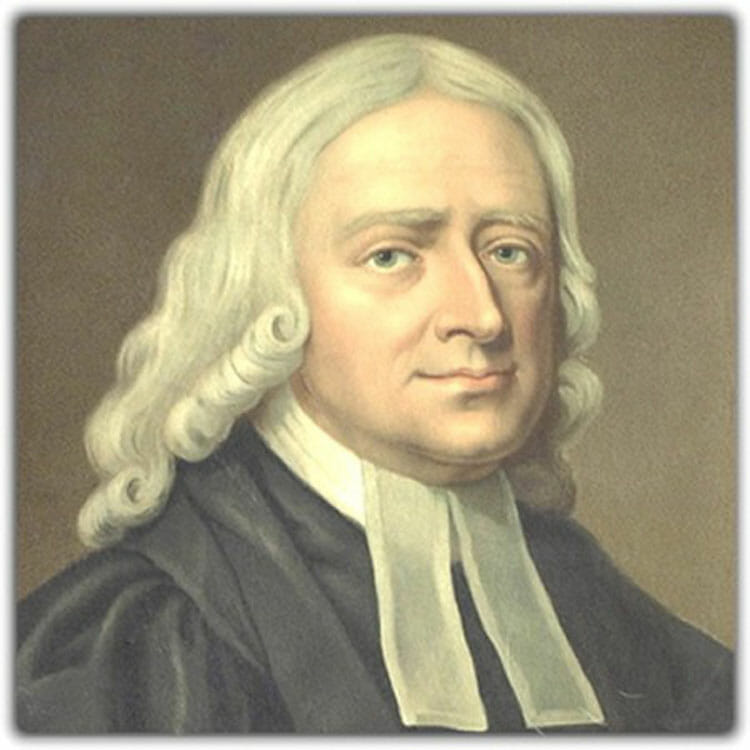By: Brian G. Chilton | February 11, 2020
What influences one’s theological system? This is an important question for all of us to consider because each one of us is a theologian. The one who claims that theology is unimportant will most assuredly still hold certain beliefs about God and the world. Thus, the person still remains a theologian but doesn’t realize it. However, each of us has been influenced by events and circumstances that shape our lives.
John Wesley (June 28, 1703–March 2, 1791) was an English theologian and an influential revivalist who was played an instrumental part in the Second Great Awakening in American history. It is estimated that Wesley rode 250,000 miles, preaching more than 40,000 sermons, and gave away around $38,881.50 during his lifetime (Oakes, “John Wesley: A Biography”).
Although he was not a systematic theologian, Wesley developed a system called the Wesleyan Quadrilateral which he held was an honest way to evaluate one’s faith. The quadrilateral is, as the name implies, made up of four blocks: Scripture, tradition, experience, and reason. All four play a role in the development of a person’s theological system.
Scripture. The first and most important element of a person’s theology was Scripture. Wesley considered himself a “man of one book” (Craig, English Prose Selections) which indicated that the Scripture formed the primary basis for his theology.
Tradition. Wesley also believed that the tradition of Christian orthodoxy held great importance to a person’s theological system. A person could read Scripture and twist the contents of Scripture in a way that was unintended. As I have been told by many professors, a person who has a belief that flies in the face of 2,000 years of tradition had better have some pretty strong evidence supporting their case in order for their belief to be accepted. Personally, I am skeptical of any doctrine that opposes 2,000 years of brilliant minds interpreting and handling Christian doctrine. New is not always better. As you follow the paths of heresies, even those ideas that are believed to be new, aren’t new at all. For example, the Jehovah’s Witness movement is actually the heresy Arianism repackaged.
Reason. The third portion of the Quadrilateral is reason. Reason is not opposed to faith. Wesley holds that reason must often be used to interpret the Scriptures. Wesley writes, “Now, of what excellent use is reason, if we would either understand ourselves, or explain to others, those living oracles” (Wesley, Works VI, 354). Reason holds a place in a believer’s life. While reason does not save, it does help a person understand certain aspects of God and his nature. It also helps a person understand the revelation that God has provided.
Experience. While a person’s apologetic system must be based on Scripture and sound reason, we cannot discount a person’s encounter with the divine. For this reason, I believe that a person’s encounter with God—or “testimony” as it is often called—holds great value. Has God done something great for you? Then, tell other people about it. We brag on everything else. Why not brag on God? Wesley, however, cautioned that a person’s experience must always be tempered by Scripture as the Bible is the foundation upon which our faith is built (Patterson, Book of Discipline, 77).
No matter one’s theological position—whether it be Calvinist, Arminian, Thomist, Molinist, or otherwise—each person can appreciate Wesley’s work on the quadrilateral system. For each branch of the quadrilateral holds an integral role in the way one understands God and the creation that he has made.
Sources
Craik, Henry. “John Wesley (1703–1791). A Man of One Book.” English Prose Selections. London, Macmillan, 1916.
Oakes, Edward T. “John Wesley: A Biography.” First Things (2004).
Patterson, Ronald. The Book of Discipline of the United Methodist Church, 1984. Nashville, TN: UMC Publishing.
Wesley, John. The Sermons of John Wesley (1872 Edition). Wesley Center Online—Northwest Nazarene University. http://wesley.nnu.edu/john-wesley/the-sermons-of-john-wesley-1872-edition/the-sermons-of-john-wesley-the-standard-sermons/.
About the Author
Brian G. Chilton is the founder of BellatorChristi.com, the host of The Bellator Christi Podcast, and the author of the Layman’s Manual on Christian Apologetics. He received his Master of Divinity in Theology from Liberty University (with high distinction); his Bachelor of Science in Religious Studies and Philosophy from Gardner-Webb University (with honors); and received certification in Christian Apologetics from Biola University. Brian is enrolled in the Ph.D. program in Theology and Apologetics at Liberty University and is a member of the Evangelical Theological Society and the Evangelical Philosophical Society. Brian has been in the ministry for nearly 20 years and serves as the Senior Pastor of Westfield Baptist Church in northwestern North Carolina.
https://www.amazon.com/Laymans-Manual-Christian-Apologetics-Essentials/dp/1532697104
© 2020. BellatorChristi.com.






[…] Source: The Wesleyan Quadrilateral […]